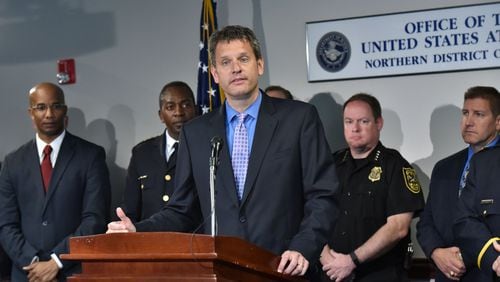Last August, a young guy named Vancito Gumbs allegedly told someone he was a "hitman for the Gangster Disciples," that he had killed people.
That the Gangster Disciples have hitmen is not surprising. What is unusual was he was simultaneously employed as a DeKalb County cop.
Whether Gumbs actually killed anyone is hard to read in the tea leaves that is the federal RICO indictment made public Wednesday. The operation netted 32 suspected gang bangers involved in an orgy of murder, drug trafficking, robbery and more in DeKalb, Cobb County, Atlanta and even Macon.
Gumbs doesn’t show up until page 38, right after a mention of Kevin Clayton, “chief enforcer” for the Disciples’ Georgia chapter. Clayton allegedly bragged he (Clayton) had brought “shooters to the table” for an especially violent round of killings in DeKalb last year.
The feds also say Gumbs traveled with the chief enforcer to “take care of GD business.” No mention of what that business was.
Gumbs had been hired just two years earlier, in November 2013, as DeKalb pushed to hire 480 cops over three years.
A month before his hire, I attended a job fair where job seekers streamed in. Cedric Alexander, then the new chief (he’s now public safety director), said the department had “lost its swagger” because of an unending stream of cops busted for crimes like helping drug rings or taking bribes.
Alexander, a doctor of psychology, said the force “needs to get its pride back, to get its strength of character back.”
Each candidate would be carefully vetted, he promised.
Gumbs, then 21, seemed kosher. He had an honorable discharge from the Army, some college and no criminal record. And then he hit the streets to fight crime.
A few months later, in the spring of 2014, I wrote about “an escalating horror show:” A man was shot to death by party crashers. Then a teen-aged girl who witnessed the killing was beaten with a brick and fatally shot. Hours later, her friends barged into her killers’ family home. They shot three women and a 9-month-old boy as they cowered in a bathroom. The baby died.
Gangs had invaded DeKalb, we surmised.
District Attorney Robert James agreed. Police were more skeptical. “We have not seen a big influx of people coming from out of state recruiting,” the gang crime unit commander told me. “We’re not seeing an escalation of violence with gangs.”
“Gangs” is a politically loaded term. No one wants to admit, “It’s happening here.”
Then last summer saw a 10-week period in DeKalb that DA James called a “reign of terror.”
Five people were shot to death and four were wounded, according to a DeKalb indictment unsealed last September. Several crimes from that indictment were referenced in the federal indictment that was just unsealed.
Perhaps most chilling was a murder allegedly committed by 17-year-old Quantavious Hurt.
On June 30, Hurt, an alleged member of the gang’s HATE Committee, or enforcement unit, sat on a car owned by a rival Bloods member. That led, naturally, to a gunfight.
A day later, a Disciples’ higher-up chided the young gangster for not having game. Shoot a Blood, he was told.
Hours later, he hid in bushes outside an Exxon on Redan Road, waiting for DeMarco Franklin to exit. Franklin, a friend of the Blood involved in the earlier gunfight, walked from the store with his girlfriend and her 3-year-old son. Hurt stepped from the bushes firing, somehow missing the toddler and girlfriend. Franklin was killed.
“The victim totally had nothing to do with it,” a cop said that night.
After the violent summer, several gang members donned bullet-proof vests. They are an organized bunch, with markings and committees and communication chains and mentors and treasurers and even those who take minutes of meetings. Kind of a badass Kiwanis Club.
A couple weeks after D.A. James’ September press conference, someone dropped a dime on Officer Gumbs for snorting coke. He admitted drug use and resigned Oct. 14 as the department was set to fire him.
His superiors have no clue whether he allegedly joined the gang before or after he was a cop. DeKalb Police Chief James Conroy said the arrest was a “black eye” but noted “his fellow DeKalb officers were the ones who locked up his fellow gang members.”
Conroy conceded “that gangs are more sophisticated,” figuring the Internet and cell phones have ensured easy communication.
About five years ago, James noticed more violent gang-related crime, something that can eat away the soul of a community.
“You saw an influx of the national gangs and everything changed,” he said. “It was like a hostile takeover” of the home-grown hoodlums. A cop as a gang member is just the cherry on the top.
The question is no longer whether big-time gangs are here.
“That’s a closed issue,” James said. “It’s not up for debate.”
The question now is, what do we do about them.
About the Author







